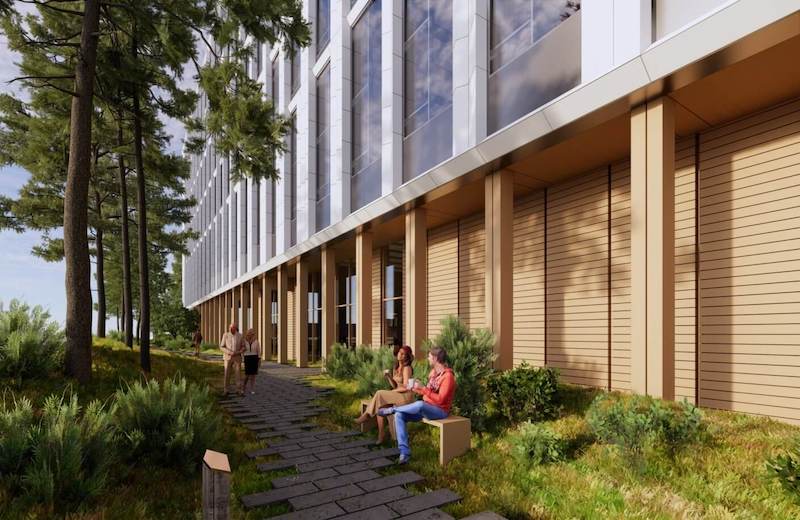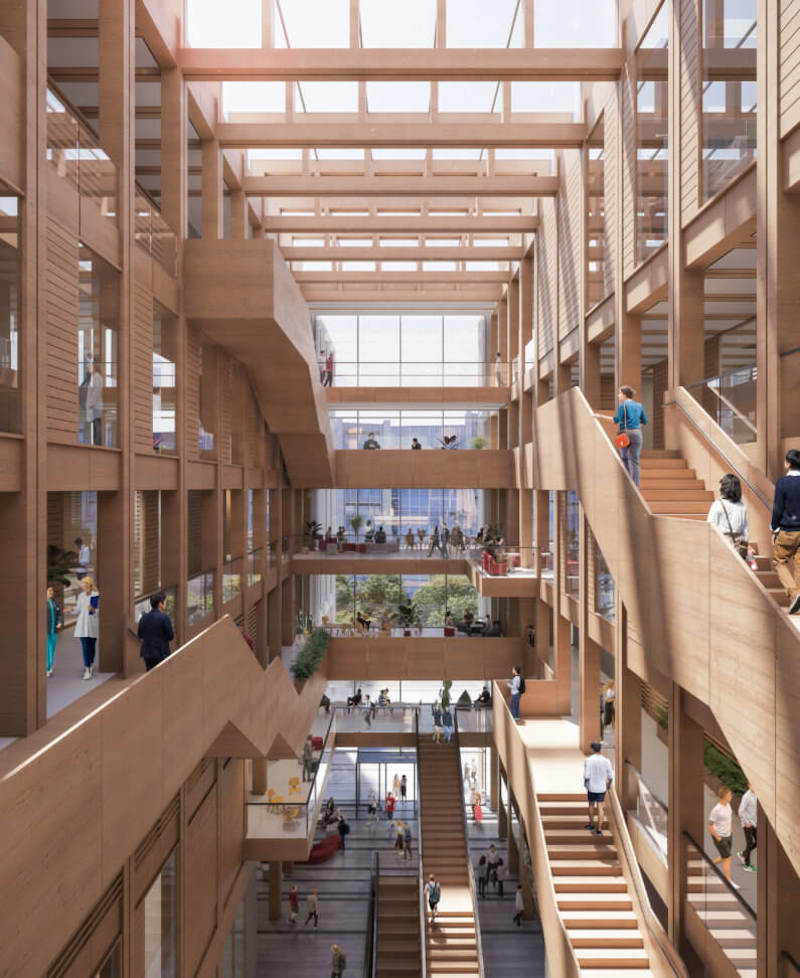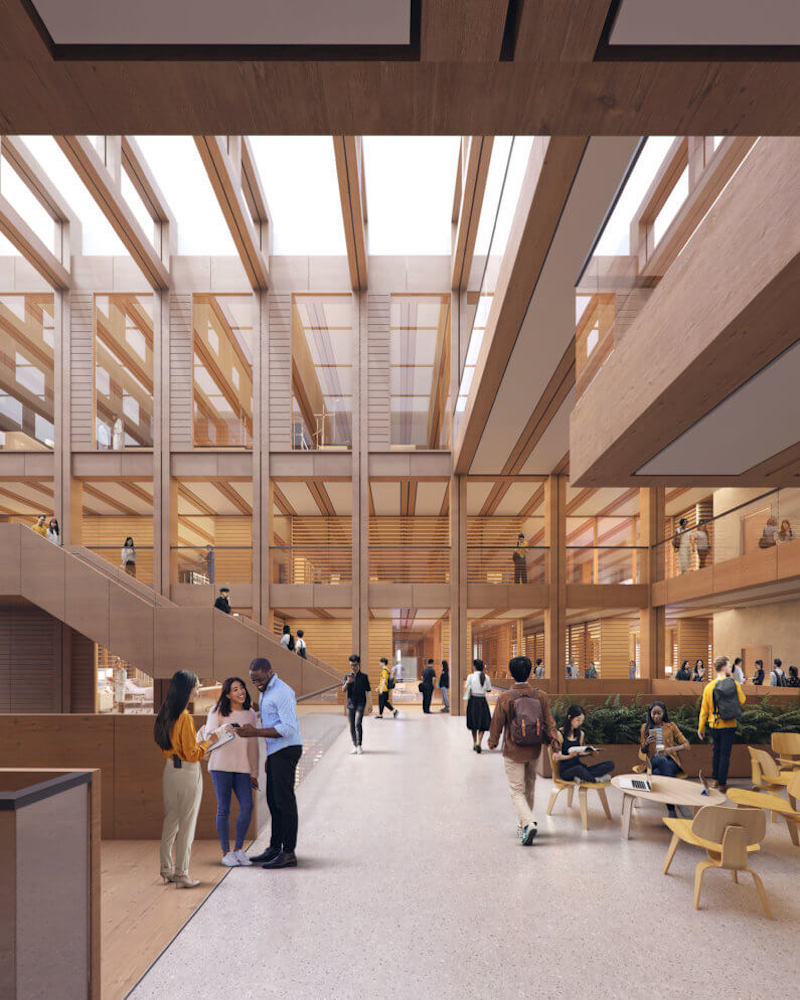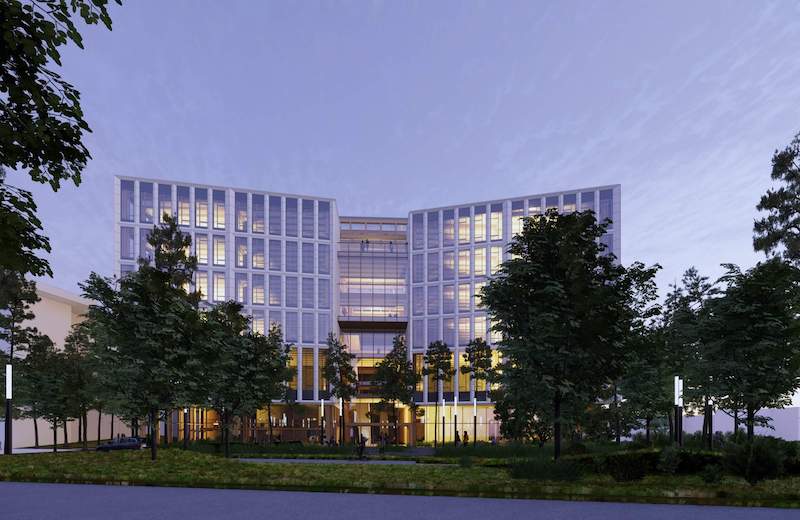Perkins&Will, in collaboration with Schmidt Hammer Lassen, will design the new health science and research building at the entrance to the University of British Columbia’s Point Grey campus.
The 270,000-sf gateway building will co-locate the School of Nursing, the School of Kinesiology, Integrated Student Health Services, and components of UBC Health and Language Sciences. It will include a mix of spaces ranging from wet and dry labs, clinical spaces, lecture theatre and classrooms, gym and fitness facilities, and office and administrative functions.

The building will feature clear and accessible circulation paths, inclusive washrooms and change rooms, and comfortable and inviting spaces that incorporate natural materials. A large public plaza and landscaping will invite people into the public space that flows throughout the building.
A central daylight-filled, six-story atrium with large interconnecting stairs reaching form the basement to the upper floors will encourage physical activity. The atrium’s open layout and visible central spaces will help to foster interdisciplinary collaboration. Additionally, windows on the ground floor will provide a connection to the landscaped outdoor environment.

The project will also acknowledge the host nation’s past and current presence and serves as a catalyst and model for future Musqueam engagement on campus. The building will express commonalities between Musqueam values, culture, and learning as well as take inspiration from traditional Musqueam building materials and design.
The project is targeting LEED v4 Gold certification with the design team proposing to use exposed mass timber for the building’s structure. The project is slated for completion in 2024.

Related Stories
| Aug 11, 2010
Living and Learning Center, Massachusetts College of Pharmacy & Health Sciences
From its humble beginnings as a tiny pharmaceutical college founded by 14 Boston pharmacists, the Massachusetts College of Pharmacy & Health Sciences has grown to become the largest school of its kind in the U.S. For more than 175 years, MCPHS operated solely in Boston, on a quaint, 2,500-student campus in the heart of the city's famed Longwood Medical and Academic Area.
| Aug 11, 2010
Giants 300 University Report
University construction spending is 13% higher than a year ago—mostly for residence halls and infrastructure on public campuses—and is expected to slip less than 5% over the next two years. However, the value of starts dropped about 10% in recent months and will not return to the 2007–08 peak for about two years.
| Aug 11, 2010
Team Tames Impossible Site
Rensselaer Polytechnic Institute, the nation's oldest technology university, has long prided itself on its state-of-the-art design and engineering curriculum. Several years ago, to call attention to its equally estimable media and performing arts programs, RPI commissioned British architect Sir Nicholas Grimshaw to design the Curtis R.
| Aug 11, 2010
Setting the Green Standard For Community Colleges
“Ohlone College Newark Campus Is the Greenest College in the World!” That bold statement was the official tagline of the festivities surrounding the August 2008 grand opening of Ohlone College's LEED Platinum Newark (Calif.) Center for Health Sciences and Technology. The 130,000-sf, $58 million community college facility stacks up against some of the greenest college buildings in th...
| Aug 11, 2010
University of Arizona College of Medicine
The hope was that a complete restoration and modernization would bring life back to three neoclassic beauties that formerly served as Phoenix Union High School—but time had not treated them kindly. Built in 1911, one year before Arizona became the country's 48th state, the historic high school buildings endured nearly a century of wear and tear and suffered major water damage and years of...
| Aug 11, 2010
Cronkite Communication School Speaks to Phoenix Redevelopment
The city of Phoenix has sprawling suburbs, but its outward expansion caused the downtown core to stagnate—a problem not uncommon to other major metropolitan areas. Reviving the city became a hotbed issue for Mayor Phil Gordon, who envisioned a vibrant downtown that offered opportunities for living, working, learning, and playing.







